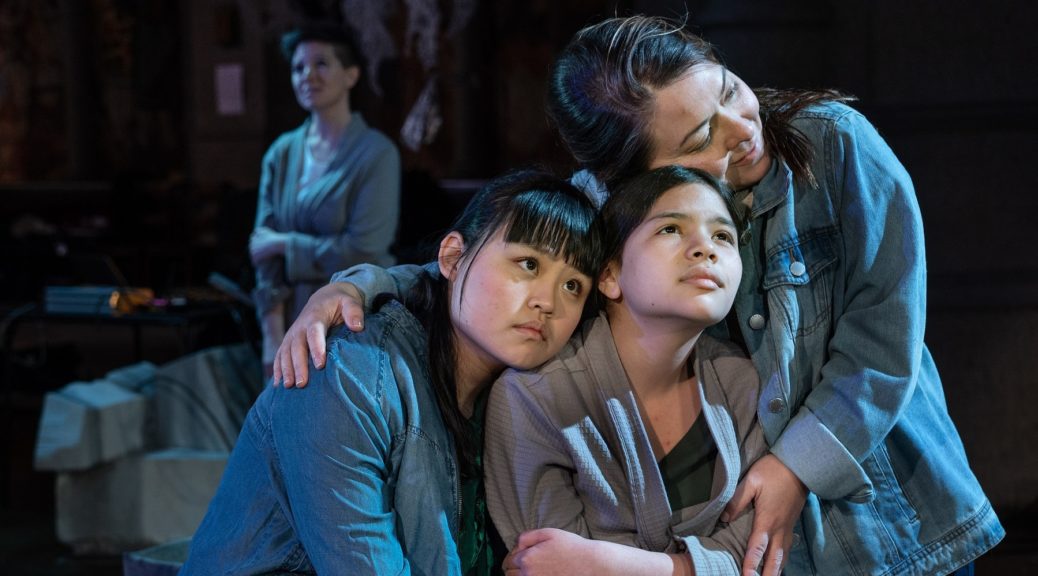
THE TIMELIEST OPERA OF THEM ALL
Though in a huge setting, it was a very intimate contemporary opera, with front-row patrons close enough to turn pages for the conductor. And the dark of the tall edifice only intensified the uneasiness of little Sophia escaping for her life in the scary woods which may or may not harbor ghosts and goblins galore.
This is “Sophia’s Forest.” If reminiscent of the spiritual inquietude of old works like “Hansel und Gretel,” “Turn of the Screw” and “Transfigured Night,” it’s highly fearsome as seen through eyes of little Sophia, fleeing a homeland during a war
How timely can you get?. It’s as if composer Lembit Beecher read the headlines about the Ukraine aggression and wrote it overnight in the manner of Mozart.
It’s a minimal work, a one-hour one-acter, with a string quartet, a cast of five, and sets like a spooky Halloween lawn display with rags and gnarled tree branches. Sorry, heavyweight patrons of the arts, but an opera with impact can evolve even without orchestra, chorus, patrons in formals, prompters, gaping cocktail intermissions, and some oversize rotating stage the size of a tennis court.
Within these limited resources, Beecher and Opera Parallèle produced a convincing drama of a haunted child whose fear was palpable. It’s a world in total collapse seen through the eyes of a defenseless child who seemingly lost her dad in the war and soon loses all respect for her loose-living surviving mom.
Unless you’re a stream-of-consciousness addict, this is not always easy to follow with two Sophias on stage (and often completely out of sight, for lack of risers) and intermittent flashbacks flipping across the years and continents of escape. And gadgeteer Beecher, with help from Drexel University engineers, has provided an array of Rube-Goldberg “instruments” with bicycle wheels and singing wine-glass rims adding to the percussion and tying in to the story line.
But the plight of his girl lost in operatic space goes straight to the heart, as played by soprano Maggie Finnegan (along with Charlotte Fanvu as the younger Sophia), in a fine cast with mezzo Kindra Scharich as the mom-turned-dissolute, Samantha Fung-Lee as the sister Emma, and Bradley Kynard as Wes, the mom’s new boyfriend.
Crucial to the drama are the disoriented Sophia discovering the high-pitched sound of wet fingers rubbing a wine-glass rim and retrieving an old music box, both of which contribute to the music. The Del Sol String Quartet provided the essential stormy backgrounds under the reliable baton of Opera Parallèle’s head Nicole Paiement.
Beecher’s female-dominated score was eminently agreeable and singable, putting pressure on the unflappable singers to vocalize without notable doubling or backup coming from the instrumentalists conveying the back-breaking Sturm und Drang. “Sophia’s Forest” creates the unsettling ambiance without ever bringing the war or booms on stage.
Brian Staufenbiel handled the challenging stage direction.
MUSIC NOTES—Both composer Beecher and librettist Hannah Moscovitch stem from families fleeing, torn by warfare: Antecedents of the former from Estonia, and of the latter from southeastern Europe.
Opera Parallèle of San Francisco. Production of Lembit Beecher’s new one-act opera “Sophia’s Forest,” with supertitle projections, Feb. 24-26, Grace Cathedral, S.F. For info: www.operaparallele.org.